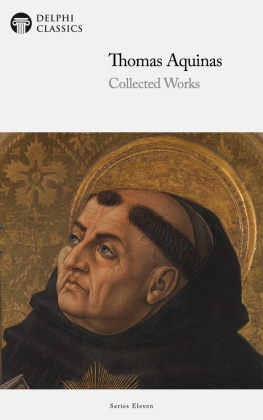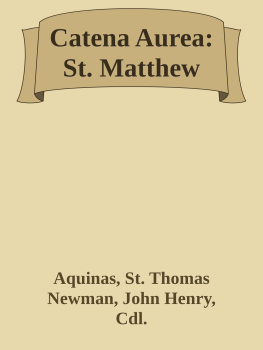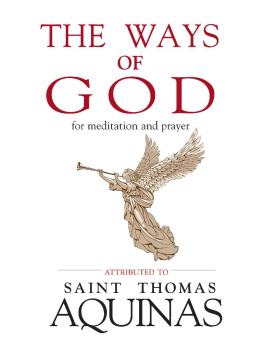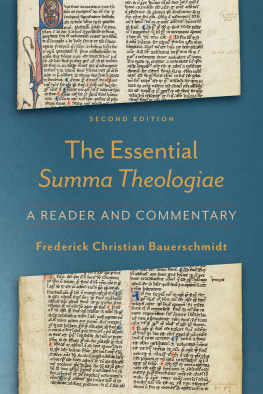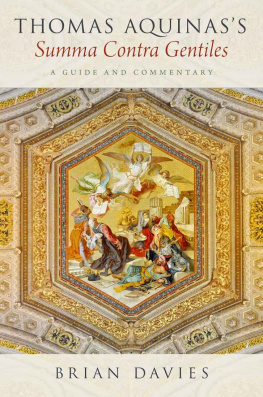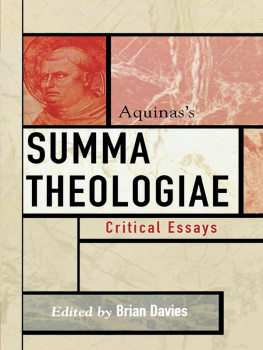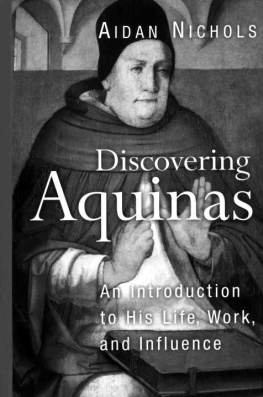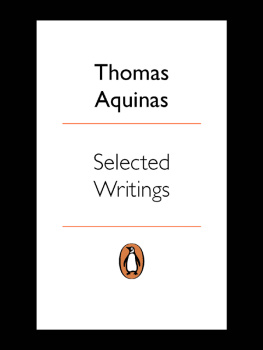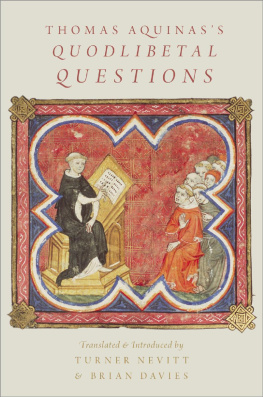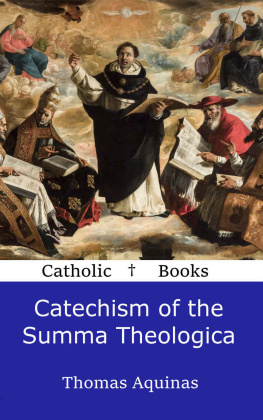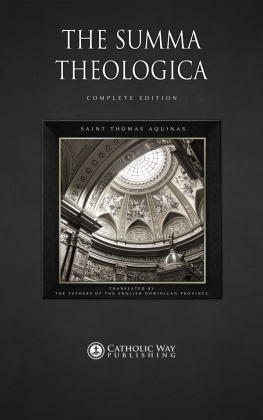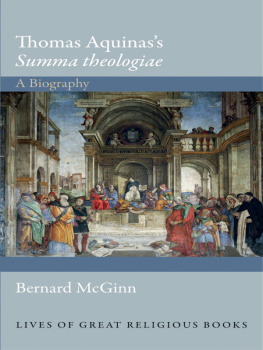The Political Ideas of St. Thomas Aquinas
Representative Selections
Edited with an Introduction by
DINO BIGONGIARI

THE FREE PRESS
New York London Toronto Sydney

THE FREE PRESS
A Division of Simon & Schuster Inc.
1230 Avenue of the Americas
New York, NY 10020
www.SimonandSchuster.com
Copyright 1953 by Hafner Press, a Division of Macmillan Publishing Co., Inc.
Copyright renewed 1981 by Virginia C. Schaeffer Jupp
All rights reserved, including the right of reproduction in whole or in part in any form.
First Free Press Paperback Edition 1997
ISBN: 0-684-83641-6
eISBN-13: 978-1-4391-0560-3
THE FREE PRESS and colophon are trademarks of Simon & Schuster Inc.
Manufactured in the United States of America
10 9 8 7 6 5
CONTENTS
QUESTION
105. Of the Reason for the Judicial Precepts
Article I: Whether the Old Law Enjoined Fitting Precepts Concerning Rulers?
77. Of Cheating, Which Is Committed in Buying and Selling
Article I: Whether It Is Lawful to Sell a Thing for More Than Its Worth?
CHAPTER
APPENDIX
THE STATE AS A NATURAL ORDER
A STATE according to St. Thomas is a part of the universal empire of which God is the maker and ruler. Its laws are, or can be made to be, particular determinations of this empires eternal code; and the authority which enforces these laws is a power whose origin is also in God. Its goal and justification is to offer to man satisfactory material conditions of life as a basis for a moral and intellectual education which, in turn, must be such as to lend itself to the spiritual edification of the Christian man. For God instructs us by means of His law and assists us by His grace.
St. Thomas follows the Aristotelian doctrine that makes of man a political animal, but he modifies it in accordance with the exigencies of his Christian philosophy. The fact that man operates, not by instinct, but by reason makes social organization indispensable. This interdependence of reason and sociability is explained by St. Thomas as follows: by endowing man with reason and at the same time depriving him of instinct and of an available ready-made supply of the necessities of life, God decreed that man should be a political animal. For to the beasts nature furnishes food, body covering, weapons of defense and offense (claws, fangs, horns, etc.), means for survival through flight (rapid wings and quick feet), etc. But all this, and much more, man must produce for himself under the direction of reason. What lower animals perform spontaneously and instinctively (i.e., by the exercise of the estimative faculty) man achieves as a result of rational processes. Beasts, without instruction, devoid of experience, deprived of models, know immediately what to do and how to act: the newly born lamb at the mere sight of a wolf runs for safety; birds hatched from eggs that have been removed from the nest, when the time comes, build a nest identical to the one from which they came and which they never saw; ailing animals instinctively pick out the herbs that will cure their illnesses. Man, however, is born with a common vague notion in place of this precise and particularized instinct. To that general notion he applies reason and thus is able to take care of himself. He, too, discovers the herbs that cure his diseases, but as the result of a process of reasoning:
Man has a natural knowledge of the things which are essential for his life only in a general fashion, inasmuch as he is able to attain knowledge of the particular things necessary for human life by reasoning from natural principles.
But for this there is need of collaborative efforts, and a division of labor is unavoidable. Again in the words of St. Thomas:
It is not possible for one man to arrive at a knowledge of all these things by his own individual reason. It is therefore necessary for man to live in a multitude so that each one may assist his fellows, and different men may be occupied in seeking, by their reason, to make different discoveriesone, for example, in medicine, one in this and another in that.
This social process implies collaboration not merely of the members of one generation and of one nation, but of all men at all times. Each coming generation which thrives on what its predecessors bequeathed to it in turn leaves to posterity an intellectual culture perfected by its own contributions. As our author says:
It seems natural to human reason to advance gradually from the imperfect to the perfect. Hence, in speculative sciences, we see that the teaching of the early philosophers was imperfect, and that it was afterward perfected by those who succeeded them. So also in practical matters. Discursive rationality implies progress.
That man was intended to collaborate rationally is proved by the fact that he alone is endowed with the capacity to speak. Speech is the specific communication of rational beings. Lower animals convey to each other only emotions or feelingsfear, desire, hunger, etc.; for such communication all that is needed is sound, e.g., braying or roaring. But man uses words, which are the outward manifestation of concepts, that is, products of a conceiving reason.
The naturally ordained distribution of tasks is described thus: One man works for many, and many work for one. A political community is made up of artisans, farmers, soldiers, statesmen, etc. These constituents must do their work with competence, which means that they must be appropriately endowed and properly trained. A state, therefore, can function only if nature produces some men who are physically strong, others who are intellectually keen, and still others who are fearless. St. Thomas, on the authority of Aristotle, assures us that such men will always be forthcoming. Being indispensable to the state, they will be furnished by nature, since the state is by nature, and nature is never found lacking in what is necessary. The diversification of capacities essential to social collaboration is the unfailing gift of nature.
In St. Thomas, however, the stress is placed on the fact that this naturality is but the execution of a decree of providence. Nature is a secondary cause and only an instrument. In his own words,
One man does not suffice to perform all those acts demanded by society, and therefore it is necessary that different persons be occupied in different pursuits. The diversification of men for diverse tasks is the result, primarily, of divine providence, which details the various compartments of mans life in such a way that nothing necessary to human existence is ever lacking; secondarily, this diversification proceeds from natural causes which bring it about that different men are born with aptitudes and tendencies for the different functions and the various ways of living.
Man cannot satisfy his instinct for social life with the resources offered by the home, nor by those available in an estate, nor even by those furnished by a village. These are not capable of providing the economic basis for being, nor the educative one for well-being. For mans nature, over and above mere subsistence, longs for knowledge and virtue. (All men by nature desire to know; and the desire for virtue is inborn in man.)
Because of these shortcomings, the above-named communities must be integrated into a larger and fuller body. Such is the self-sufficient group which St. Thomas (after Aristotle) calls the perfect community. It is the city-state (polis), the civitas,


